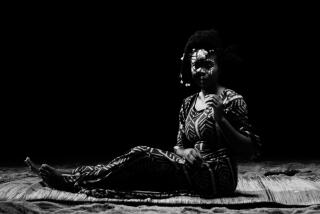Nigerian President Looks to Better Nation’s Lot
- Share via
ABUJA, Nigeria — President Olusegun Obasanjo ended his inauguration speech four years ago with the parting entreaty: “May the Almighty help us.” The remark reflected his strong religiosity -- he is a born-again Christian -- but also his awareness that military dictators had left this oil-rich country in a ruinous condition, beset with violence, corruption, disease and poverty.
As Obasanjo, 66, prepares to begin his second and final term at month’s end, he no doubt is still seeking divine help. But analysts said the president, whose reelection last month was marred by allegations of vote-rigging, must make tangible progress toward solving Nigeria’s deep-rooted problems or risk leaving an empty record.
“I think he will do better,” said Howard Jeter, the U.S. ambassador to Nigeria. “This is legacy time.”
Obasanjo already has promised a new approach. He said his next administration, to be announced soon, will include progressive Nigerians not afraid to pursue real reform. Members of his current Cabinet include government ministers who had dutifully served military dictators during the last three decades.
In a recent interview with the Los Angeles Times, Obasanjo said he would like to leave a legacy “of a Nigeria on the path to economic prosperity.” After his reelection, he said, he knew the consequences of not achieving his goals.
His new government, he said, has to “prove we can perform better, and we will have no excuse for not doing so.”
Real reform was what Obasanjo promised when he left his pig farm in southwestern Nigeria for the presidential villa here. In his first administration, the former military head of state -- whose 1999 election was widely promoted by the generals who had ruled for the previous 15 years -- pledged to root out corruption, improve security and make this nation an economic juggernaut.
Four years later, Obasanjo has little to show for his efforts -- or lack thereof. His anticorruption drive has failed to net former generals and senior officials who looted billions of dollars from the treasury. About 10,000 Nigerians have died in ethnic and religious violence since 1999, the most such fatalities during any administration since the nation’s 1967-70 civil war.
And Nigerians are becoming poorer by the day, with about 70% of the country’s 129 million people living on less than $1 a day. Vast numbers of people lack jobs, roads, electricity, water, schools and access to health clinics.
Obasanjo likes to say one of his biggest achievements is that he has kept this fragmented country of more than 250 ethnic groups from disintegrating. He has had to contend with the adoption of Sharia religious law in 12 states in the predominantly Islamic north and the subsequent bloody clashes between Muslims and Christian minorities. The bloodletting has spread to the southern oil-producing Niger River Delta, where residents have been battling government soldiers and foreign companies for a share of the oil wealth.
*
Messianic Man
Many who know Obasanjo said he has seen himself as a messianic leader since his release from detention when his jailer, military despot Gen. Sani Abacha, died in 1998.
At his first inauguration, Obasanjo described himself “as a man who had walked through the valley of the shadow of death,” said Karl Maier, author of “This House Has Fallen: Nigeria in Crisis.” Now, the president begins each morning with a game of squash, then holds a revival-style prayer meeting in his villa for some of his closest staff members before attending to matters of state.
Shehu Sani, a civil rights leader who shared a prison cell with Obasanjo, said the president flopped in his first administration because he did not take on Nigeria’s power elite: the generals and their cronies.
“From our talks in prison, he knew what was wrong with Nigeria and what needed fixing,” Sani said during a recent interview. “But the day we got out of jail, he was a changed man. He started forming relationships with the same people who were the source of the country’s problems.”
In his four years in office, Obasanjo has taken at least 100 foreign trips, spending more than a year outside Nigeria and causing wags here to dub him the “absentee president.”
Obasanjo and his advisors said that when he became president, Nigeria was saddled with a record as one of the world’s worst pariah states. To secure investment, debt relief and repair Nigeria’s battered image, Obasanjo believed it more efficient to meet world leaders and personally make his case, the advisors said. Analysts said the president has not secured significant financial help but has improved the country’s standing in the world community.
“He’s helped to put Nigeria back on the diplomatic map. But the next four years has to be spent dealing with issues that are Nigeria-specific,” said Chris Fomunyoh, an Africa analyst for the Washington-based National Democratic Institute for International Affairs, which is affiliated with the Democratic Party.
Analysts said one of Obasanjo’s first tasks will be to resolve the conflict in the Niger delta, whose oil exports account for the majority of the country’s economic output. In March, Nigeria said it lost nearly 40% of its 2 million barrels a day of oil production when fierce battles triggered by locals seeking a share of the petrodollars caused foreign oil companies to temporarily close operations.
*
Farmers Need Aid
Economists have said the president must pump more money into agriculture so that Nigeria can again become a net exporter of food and no longer dependent on foreign imports.
Maier said Obasanjo could try to reproduce one of modern Nigeria’s greatest economic successes. Cellular telephone business took off after the president worked to deregulate the communications industry. In less than a year, Nigeria moved from a country with fewer than 100,000 working land lines and virtually no other phone service to a nation with more than 1 million cellular phones.
Obasanjo would leave Nigeria with a lasting legacy if he deregulated the power industry, Maier said. The state-owned National Electric Power Authority is a laughingstock among Nigerians, who say its acronym really stands for Never Expect Power Always because blackouts sometimes last months.
“If he could deregulate the power industry successfully, it could bring about complete changes to the way business is done in Nigeria,” Maier said. “It could benefit the Coca-Cola seller to the foreign investor who wants to do business in the country.”
More to Read
Sign up for Essential California
The most important California stories and recommendations in your inbox every morning.
You may occasionally receive promotional content from the Los Angeles Times.












